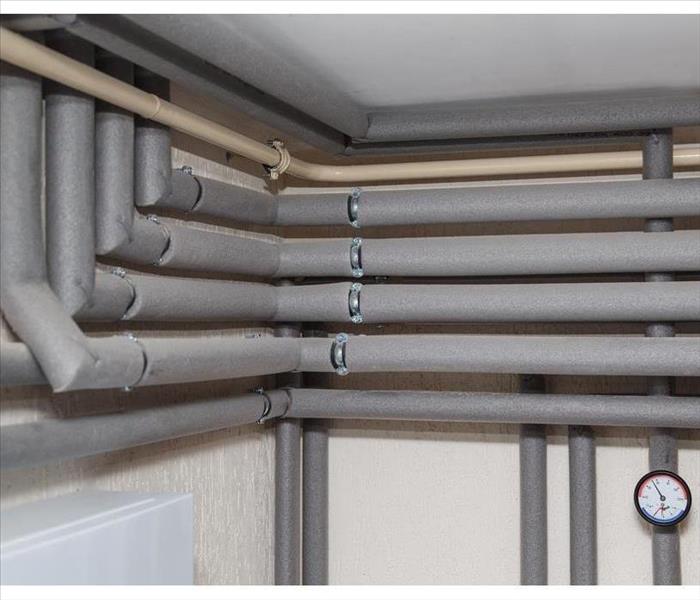Preventing Your Pipes From Freezing
11/21/2022 (Permalink)
Keep Your Pipes From Freezing
If you live in a colder climate, the danger of frozen pipes is real. If your home's water supply freezes, it can cause serious damage to home appliances and fixtures. The good news is that there are steps you can take before and after the coldest days of winter strike to prevent frozen pipes from occurring in your home.
When Temperatures Drop Below Freezing, Beware of Freezing Pipes.
When temperatures drop below freezing, it is time to worry about water pipes in your home freezing. Frozen pipes can burst and cause flooding, they can cause damage to your Hamilton, OH home's foundation or structure, and they can also cause water to leak into your home. If the water is not contained within a frozen pipe, it will start seeping through cracks in the wall or flooring. This can lead to mold and mildew growth.
There are several ways that you can prevent freezing pipes:
- Insulate your water supply lines with foam insulation tape if possible
- If you cannot access these lines directly then use an insulation blanket around them instead
- Be sure any windows that do not have storm shutters on them are covered properly with clear plastic sheets so cold air does not enter through them
- Keep all vents closed off from areas that could be exposed due to drafts causing cold air currents
How to Avoid Pipe Freezing
Use heat tape. If you have an electric water heater, consider running a small space heater near it. You can also use heat tape to insulate valves and pipes in your basement or crawlspace, but keep in mind that it's a fire hazard if used improperly.
Use insulation. Insulate any exposed pipes that are vulnerable to freezing by wrapping them with foam or cloth pipe sleeves or other types of insulation. Before wrapping them up though make sure there are no leaks first!
Check for leaks and turn off the water supply when you leave your house, so you don't come back to frozen pipes.
How To Thaw Frozen Pipes
There are several ways to thaw frozen pipes. The best way to thaw them is by using hot water, but not just any old hot water -- you need to ensure that the temperature is high enough so that it will be able to melt the ice without damaging your pipes.
If you want to use hot water, here are some options:
Use a hair dryer set on "high" and directed at the pipe. This will take longer than other methods but won't damage your plumbing.
If there's an outlet nearby where you can plug in a space heater or blow dryer, turn those appliances on low and point them at the affected area for ten minutes or so until everything melts away. You can also try putting towels soaked in very hot water against frozen pipes; they'll help transfer heat into them faster than if they were left alone in the cold air around them!
Alternatives to Permanent Pipe Freezing Protection
While protecting your pipes from freezing is important, there are other options that can help you save money on heating costs.
Insulate the spaces around your pipes. If you have an attic or basement, it's a good idea to insulate any areas where cold air or water might be able to get inside and freeze the pipes. You can also insulate crawl spaces or basements if they're exposed to outside temperatures all year round. This will help keep the temperature inside these areas warmer than outside, preventing freezing in those places as well.
Replace outdoor faucets with frost-proof models or reroute pipe runs so that they don't run through unheated areas such as garages or porches during winter months of low humidity (this is what I did for my outdoor spigot).
Place space heaters near pipes that may be prone to freezing during cold weather periods when regular heating systems aren't working properly.
The best way to prevent pipe freezing is to keep your home warm by using space heaters or blankets. If you cannot afford these options, then you can use a blow dryer on low and place it near the pipe that has frozen. Another option would be to wrap the frozen pipe in towels soaked in hot water as soon as possible; this should thaw out any pipes that have been damaged due to cold temperatures outside your home.




 24/7 Emergency Service
24/7 Emergency Service
